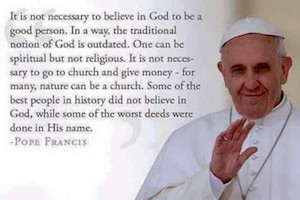When Pope Francis came to New York last week traffic came to a standstill. But traffic on social media was brisk, with many of my friends from the social justice world celebrating the Pope’s “liberal” (read: barely modern and centrist in the overall scheme of things) take on hot-button domestic issues. The Pope believes in climate change! He cares if people are starving! He’s willing to let priests forgive women for abortions, at least for a single year of “mercy” (normally, you see, abortion is such a grave sin that a bishop has to be entreated for forgiveness).
And then the news leaked that the Pope had met with Kim Davis, and suddenly all that changed: My Facebook feed was filled with anger, vitriol, and even a sense of betrayal that the Pope was supporting religious exemptions.
Now on one level, this just seems bizarre. Of course the Pope supports religious exemptions. He’s the POPE. The US Conference of Catholic Bishops pays fancy lobbyists every year to push for broad readings of religious exemptions laws. And who’s their boss? The Pope. Many of the non-profit organizations objecting to even signing the form to take advantage of the accommodation from the Affordable Care Act’s contraceptive coverage requirement are Catholic organizations. So why is it so surprising that the Pope would support Kim Davis and her attempt to claim a religious exemption to performing same-sex marriages—or even appearing to validate them in her official capacity?
I think the answer is that this strange disjunct is a result of the enormously divided and recalcitrant split between America’s political parties. This Pope believes in global warming, he clearly cares about the poor and disenfranchised, he seems to genuinely be committed to humility and relieving the suffering of his flock. And in America, if you believe in the science of climate change, truly care about poverty, and want amnesty for undocumented immigrants, you’re a liberal. In fact, liberals have adopted this Pope as their mascot so ardently that last week my social media feeds were filled with people reposting the fake quote in the picture below. It appeals to social-justice oriented American liberals because it echoes their beliefs.
Hence the betrayal when the Pope met with Kim Davis and encouraged her to continue her martyrdom. Liberals felt let down and deceived, as though the Pope had misled them about his politics.
But in fact it’s a strange and artificial aspect of American politics—not the Pope’s politics—that understands concern for the disenfranchised and the marginalized to be incompatible with a deeply conservative view of religion’s place in the secular world and a commitment to a paramount religious authority.
In America, conservatives want broad religious exemptions, tax breaks and policies that clearly benefit the wealthy, and border control. But those ideas aren’t necessarily related; they’re just an accidental cluster created by various political dynamics that are, globally-speaking, regional.
This matters because the Pope is not a liberal. If you’re a liberal, the Pope is not your friend (unless you’re Kim Davis). The Pope’s celebrity has somehow, in the American liberal imagination, separated him from the politics of his institutions to the extent that while people realize that the US Conference of Catholic Bishops opposes any regulation of religious exemptions, they remain surprised to see the Pope take that same position. Many people were sharing the fake quote pictured above; no one was sharing the fact that after the Pope made much milder comments in a 2013 homily that seemed to suggest openness to non-believers, the Vatican rushed to clarify that those who are aware of the Church need to “enter” her to find salvation.
Now, I’m all for a feel-good Facebook meme. And there are certainly things about Pope Francis that are refreshing compared to his predecessor. But it’s dangerous to gloss over the deeply conservative nature of the Catholic Church, or to assume that because the Pope believes in (some) science or lifts up some of the Church’s longstanding teachings on poverty it means the Church is entering the modern era of progressive politics.
Contrary to the argument I often hear when I raise these points, I’m not persuaded that it’s “important” for us to lavish the Pope with accolades and adoration for being, in so many words, not as terrible a Pope as the last one. The Pope doesn’t need our support. He’s got the biggest constituency in the world, and it’s provincial of us to think that the approval of American liberals is somehow going to help guide him over to “our side.” The Catholic Church is a deeply culturally conservative institution with a global reach, and its politics have not proven malleable on the core culture-war issues of our day—in other words, the full legal and political equality of LGBT individuals and women.
And don’t even get me started on the idea that only a Bishop can normally pardon an abortion. That’s a whole other post.





